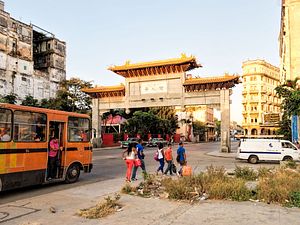“The barrio chino? Not even the Chinese go there.”
In Havana’s barrio chino, or Chinatown district, this is not an uncommon phrase. One of Latin America’s oldest Chinatowns is a shadow of its former self: the stone Paifang gate and a few waitresses in red cheongsam (or qipao), all that distinguish it from the rest of the city.
Yet Cuba itself is awash in Chinese tourists and, increasingly, investors. China has become the main export destination for Cuban goods, as well as the main importer on the island. Yutong buses carry tourists and locals alike, and Huawei is set to be the main provider for the country’s growing internet ventures. Yet the capital’s barrio chino is noticeably lacking in Chinese diaspora, most of whom fled the island soon after Fidel Castro nationalized businesses in 1959. Those that remain have long since scattered into other districts or left Havana altogether.
It all makes for a rather weak Chinese presence outside of government circles, and complicates what should be a prime case for diaspora diplomacy. Though the history of Sino-Cuban relations is known and respected throughout Havana from aid in the war for independence to their shared identity as communist nations, contemporary China is a different matter altogether. Despite the enthusiasm from Cuban elites for further engagement with China, the general public looks cautiously at Beijing’s growing global influence, wary that the imbalance of power will place the island in a client state position, akin to its past relationship with the United States.
On a more personal note, many Cubans can easily recount instances of anti-black racism by Chinese visitors. That these sorts of interactions form the basis for many Cubans’ impression of Chinese citizens is hardly ideal for winning over public opinion.
Chinese public diplomacy is still developing, and for the most part the county’s concerns are regional rather than international. Nonetheless, soft power will prove a much-needed component of Beijing’s strategy in Latin America, which still leans ideologically toward the West.
Recognizing the economic and diplomatic opportunity in Latin America, China initiated dialogue with the Community of Latin American and Caribbean States (CELAC) via the inaugural China-CELAC Forum in 2015. Although China has held observer status within the Organization of American States (OAS) since 2004, its interest in CELAC signaled a shift, as the organization is not only markedly leftist, but explicitly excludes the United States and Canada. The 2015 China-CELAC Forum and its successors demonstrate China’s regard for Latin America outside of the shadow of the Western alliance.
Cuba specifically is not perceived to be a pressing issue or an indispensable ally, and thus the resources available for reforming China’s approach in the country are limited. But the case nonetheless holds appeal for the potential of furthering Chinese soft power throughout Latin America and the Caribbean. China offers an ideological alternative to the Washington Consensus, which piqued the interest of the region even before the current nadir in relations with the United States. Given this context, it is logical for China to capitalize on its existing historical ties with Cuba, whose revolutionary principles still lend it symbolic weight in regional politics.
The barrio chino still marks the Lunar New Year with a dragon dance, and each year Cuba commemorates the anniversary of the first Chinese migrants to the island. Meanwhile, the Confucius Institute of Havana has enrolled thousands of students despite having only opened its doors in 2009. It is the ideal arena for Chinese soft power overtures, with a historical backdrop and an eager audience.
Diaspora diplomacy is usually characterized by the independence of groups from their homeland government, which makes them harder to direct but has the advantage of staving off accusations of interventionism. The Chinese-Cuban diaspora is small but organized. It will also benefit Beijing if cooperation between Beijing and the diaspora group is encouraged. Such cooperation might both ease travel between the two countries and mitigate anti-Chinese sentiment in Cuba. Chinese foreign policy rhetoric is fond of promising “win-win” relationships, and approaching public diplomacy in Cuba through the barrio chino will do just that.
Yesenia Vargas is a recent graduate of the Master of Public Diplomacy program at the University of Southern California. She previously earned a B.A. in Political Science and B.A. in French at Centenary College of Louisiana.

































